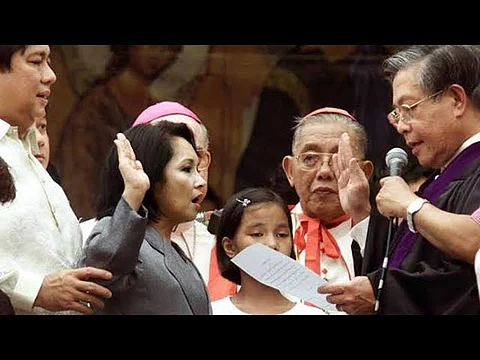
- NEWS
- the EDIT
- COMMENTARY
- BUSINESS
- LIFE
- SHOW
- ACTION
- GLOBAL GOALS
- SNAPS
- DYARYO TIRADA
- MORE

Gloria Macapagal- Arroyo, GMA for short, was the President of the Republic 15 years ago. Scandals, massive corruption, Cha-cha (Charter change), coup, and impeachment became synonymous with her administration.
Expectations were sky-high when she took over the presidency from Joseph Estrada, who was ousted from Malacañang via people power (EDSA Dos) early in his mid-term in January 2001 over allegations of plunder related to jueteng operations.
Succeeding the populist Erap was a mix of triumph and challenge for her. The country was still grappling then with the chaos left by the administration of the late strongman Ferdinand Marcos Sr.: crippling debt, recession, mass poverty, widespread corruption, to mention a few.
And by the time she ascended to the presidency, public confidence in good governance was already fractured. She pledged to combat corruption, implement economic reforms, eradicate poverty, generate more jobs, and improve education and living.
GMA was a top-notch economist and had a robust academic background before her debut in public service. She served as former president Cory Aquino’s Trade and Industry undersecretary before she became a senator, earning her a reputation as a policy-maker and competent legislator.
She is also the daughter of former president Diosdado Macapagal, a renowned reformist.
Unlike her predecessors, GMA’s demeanor falls short of performative charm. But what she lacked in charisma, she made up for in precision. Fiscal discipline was prioritized, and tax reforms were introduced, which helped the country pay its ballooning debt.
GMA’s good branding, however, was short-lived. In 2004, she reneged on her promise not to run for president, which cost her credibility. She was not barred from running for the top post after finishing the three years left by Erap. But there was a mounting discontent with her leadership then.
The election came. GMA won against the famous actor and standard-bearer Fernando Poe Jr. A year later, she was embroiled in the biggest scandal in the country’s electoral system — the “Hello Garci.”
It sparked public outrage, massive protests, calls for resignation. But instead of stepping down, she refused to release her grip on power.
She was a paradox: accused of election rigging, yet praised for keeping the economy stable; berated for corruption, yet applauded for infrastructure growth. Under her watch, the country saw the global financial crises of 2007 and 2009 and somehow stayed afloat.
Although her legacy was marked by deep controversy, there was also significant economic progress under her watch. Her administration strived to address poverty and unemployment.
Despite heavy flak, Arroyo impressively finished her term in 2010, defeating coups and multiple impeachment attempts — thanks to her loyal allies in Congress.
Fertilizer fund scam, the multi-million dollar NBN-ZTE deal, and the PCSO scam resurfaced after her presidency. In 2011, she was charged with electoral fraud, and later, arrested on charges of plunder. Then Rodrigo Duterte, her ally, became president in 2016. In the same year, GMA was acquitted by the Supreme Court.
After she left Malacañang, GMA ran for a congressional seat, where she championed bills on economic reforms, education, health, and institutional development, among others.
In 2018, she pulled off a pivotal moment in the history of Congress when she became the first female — and former president — to be speaker of the House. Her installation for the top post was a fallout of a dramatic turn of events that broke out just hours before then-President Rodrigo Duterte delivered his third State of the Nation Address.
She replaced embattled Pantaleon Alvarez, who stripped her of the deputy speaker and committee chairmanship posts after she voted against the Alvarez-led death penalty bill — a contentious policy she abolished in her capacity as president in 2006.
At the present 19th Congress, GMA faced a similar fate when she was demoted from the senior deputy speaker following an alleged coup attempt against party mate, Speaker Martin Romualdez.
Despite all these political dramas, GMA remains a formidable force in Philippine politics. Her three-decade-long career was both a political survival and strategic endurance.
Fresh from the victory in the 12 May polls, GMA is still seen as a dominant force in the upcoming 20th Congress.
